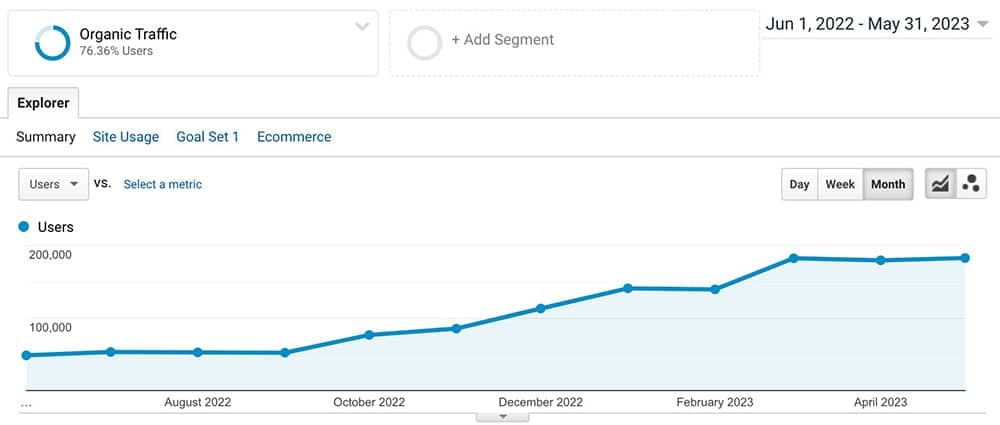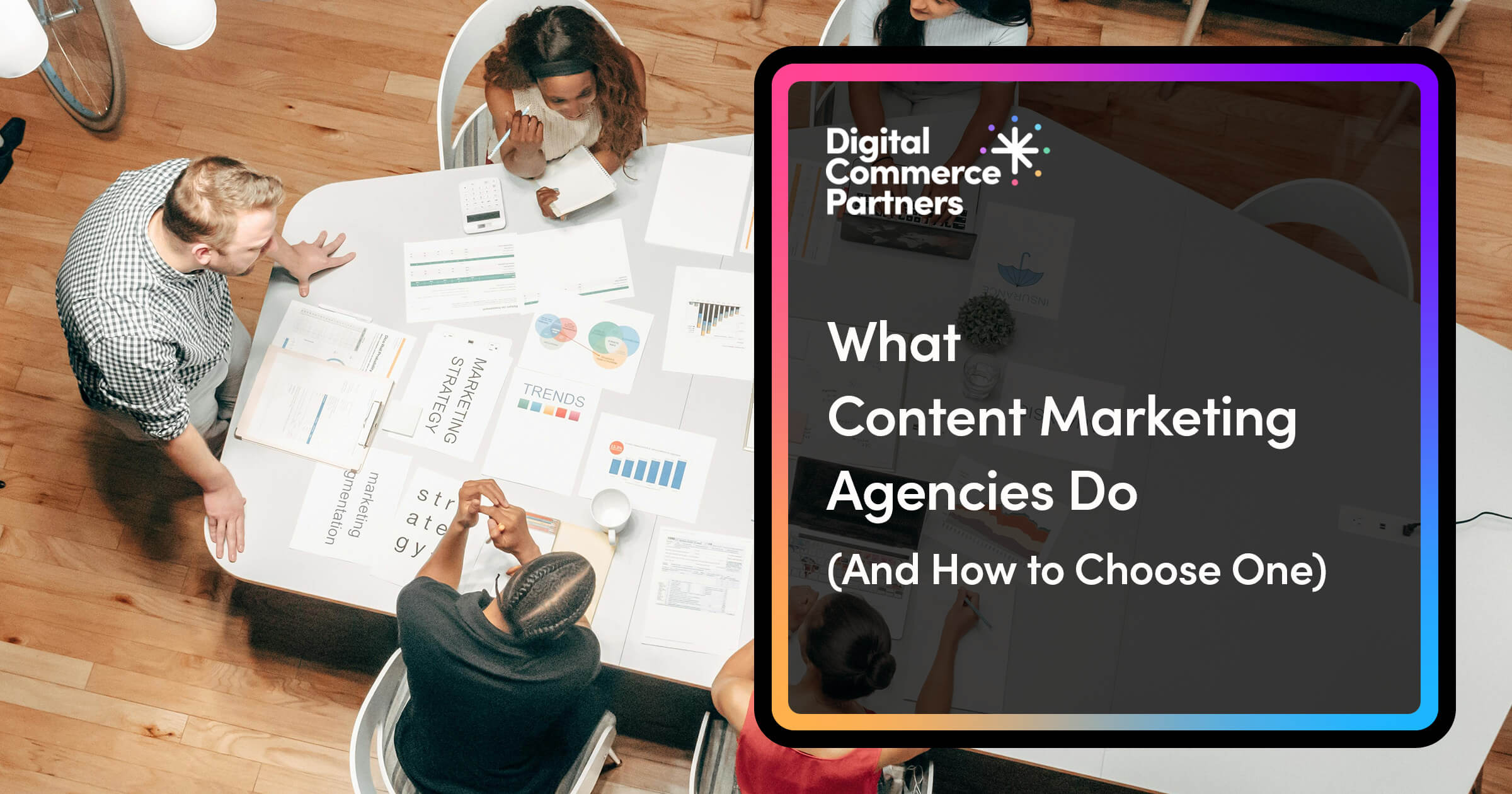A content marketing agency can help you hit targets that matter to your business – like visibility, leads, conversions, and revenue.
When you find a good fit, it’s like having a strategic partner to unlock hidden potential in your business.
But what do we actually do?
I’ve been answering this question for a few years (at every family gathering) – so I know it can sound mysterious. This article is a simple overview for anyone considering getting outside help with content marketing.
If you already know you need one, jump ahead: How to Choose the Right Agency.
What Is a Content Marketing Agency?
A content marketing agency is a partner that can help design and implement all or part of your inbound marketing strategy. They have expertise in SEO, content strategy, article writing, email marketing, and conversion optimization.
The term content marketing can include any free content your potential customers engage with before they buy. It’s inbound, meaning customers find you when they’re searching for help with problems that your product or service can solve.
When someone organically lands on your website, the right content will draw them in – they’ll engage further. They may not be ready to click “buy” – depending on where they are in the buying journey – but the right content stepping stones will move them closer.
Combined with lead capture and conversion strategies, content forms the backbone of performance marketing. It’s measurable, testable, and endlessly adaptable.
Get more leads with less effort.
If you want a steady flow of targeted leads, we’ve got a proven process for driving organic traffic and converting it into qualified leads.
What Can a Content Agency Do?
To give you a better idea of all the projects and tasks a content marketing agency can help with, I’ll walk you through what our agency does – with a caveat:
Avoid getting hung up on packages and service offerings too early in your search.
Why? Because you might not know the best way to reach your goals with content. Different agencies may have perspectives and ideas you haven’t considered.

Instead, look for agencies that know your market and business model. Interview them extensively. (Keep reading for “what to ask” – and check out Google’s excellent guidance on hiring SEO experts.)
Content marketing services can include:
- Content strategy: Developing custom strategies to drive organic search traffic
- Content audits: Analyzing the website and recommending changes to existing content to optimize for SEO, engagement, and conversions
- Article writing: Writing and editing blog articles and other creative content
- Copywriting: Writing and optimizing copy for website pages, including home pages, product pages, about pages, and more
- Publishing and on-page SEO: Setting up and publishing content, including images, structured data, and other on-page elements
- Product and category pages: Analyzing and recommending changes for ecommerce site structure, copywriting, product marketing, and conversions
- Landing pages: Copywriting and optimizing key pages for lead capture
- Email marketing funnels: Copywriting, implementing, and optimizing email campaigns
The line between SEO and content marketing is blurry, and successful strategies merge them. So our work involves a heavy dose of analytical and technical SEO, looking at each individual page and the site as a whole.
We also work closely with clients when they’re working internally on anything that might impact the SEO or conversion strategy – like site redesigns, server migrations, or new product offerings.
Do you have an idea which areas might need attention in your business? Then it’s time to start assessing likely candidates.
How to Choose a Content Marketing Agency: 7 Questions to Find the Right Fit
Content marketing and SEO are tools.
They can be powerful tools for good – helping your business help more people.
But in the wrong hands, they’re ineffective and potentially damaging to your site’s performance. It’s worth the time and effort to talk to a few service providers before committing.
Use this list of questions as a framework for assessing your options.
1. How will content services support my strategic goals?
A strategy-first agency will insist on having a conversation about your business and goals before they recommend a specific course of action. Don’t buy a service package without a discussion about strategy.
Before gathering outside perspectives, ask yourself this question. It will help frame discussions around what you’re trying to achieve in your business – not just your website.
Think of a goal for your website – like doubling organic traffic. The underlying business goal might be to triple subscriptions, quote requests, or product sales.
Designing the most efficient path to reach that goal involves research to:
- Uncover details about what drives your revenue
- Understand how you fit into the competitive landscape
- Assess your current SEO and site performance
- Know your ideal audience and customers
- Find out what matters to your audience
- Analyze your existing content assets
When we know all of this, we can recommend the most impactful actions. We can also provide a more educated estimate about the scope, timeline, and potential results.
And if your site isn’t going to benefit from what we do, we’ll tell you.
2. How will you measure success?
Traffic and rankings will inevitably be part of the discussion, but business results matter more – qualified leads, conversions, sales, or revenue.
Beautiful spreadsheets and slide decks are the love language of SEO agencies. We love data. We love automation. We love showing you our cool reports!
But if we don’t have a meaningful KPI, the reports won’t have much value. Organic clicks and keyword rankings are easy to measure – but not necessarily an indicator of success.
For example, a client came to us with a goal of growing their membership community through email marketing. We couldn’t be successful if we only focused on publishing articles and increasing traffic.

“Traffic without a destination, without something to do – doesn’t do any good. But after DCP implemented a conversion funnel, our subscriber list doubled overnight!”

Duane Gordon
President, ADD.org
We also worked on key pages of the site to help more people access ADDA’s resources and support. We measure success by new email subscribers:

3. How do you manage projects and communication?
A careful and deliberate process is non-negotiable with SEO and content strategy. Find out how the agency manages projects and client communication.
- Who will be your main contact person?
- How will you know what’s happening with your site?
- How often will they update you on progress and results?
- How many people will be working on your project?
- How will they coordinate with you or your team?
I spend more time thinking about how our agency works than what we’re working on (I’m in operations, so that’s where I shine).
Many agencies start out as small consultancies, with one or two people doing the work. At that size, you don’t need as much structure. That’s not necessarily a red flag. It’s how we started, too!
As our team grows in complexity, we need more and more structure. We now work with an agile project management style to stay focused, adaptable, and efficient.
But overly focusing on speed of implementation (or a general sense of chaos) could indicate a haphazard approach.
Communication habits can also be revealing. If the person you speak with thinks they know your business better than you (doesn’t listen or provide thoughtful responses) – expect more of this when you start the project.
Now I’m going to possibly make things foggier – too much rigid structure can also be a problem. You don’t want to stick with a process when it’s no longer working.
In 2023 alone, Google rolled out eight algorithm updates. Effective agencies balance agility and structure to anticipate and react to changes that impact performance.

4. Realistically, what results should I expect?
Be wary of guaranteed results and timelines. Look at past results as indicators of what’s possible, not guarantees of what will happen for your site.
Content is not a quick fix for a struggling business. Sure, quick revenue wins can and do happen – sometimes after fixing an SEO issue or conversion problem.
But in general, it’s a long-term investment to grow organic traffic. It’s typically going to take 6-12 months. Expect the longer end of that range if you’re starting with really low numbers or a brand-new site.
It takes patience. If you choose the right agency, you’ll know what to expect – you’ll be able to trust the process.

“It’s rare to find a company that moves the dial and makes an impact like you do. We know it takes some time, but we trust you to get us there. “

Lyn Christian
SoulSalt Founder
If an agency is promising the moon, without a clear explanation of how to get there, be wary. Look for transparency and open communication about methods they’ll use, as well as potential challenges that may limit results.
5. How do you collaborate and create unique content?
How will you collaborate – and how will your content stand out?
Search engines are getting too smart to promote “SEO content” these days. But you don’t have to dig deep to find keywordy, unhelpful, borderline unreadable content.
Content can be cranked out quickly and cheaply, with the help of AI and inexpensive labor. This approach can sometimes get you a quick (temporary) traffic win.
If you want to avoid adding to the pile, choose an agency that values collaboration and quality writing.
Genuinely helpful content takes more care and effort to create. But we know it’s the best way to compete for valuable rankings and win customers long-term.
How can you tell? Ask how they work and collaborate:
- Who will write your content?
- How will they incorporate your brand voice?
- Do they have a process for collecting unique perspectives or subject matter expertise from clients?
- What’s their process for quality control?
- How will they collaborate with you and your team?
- What’s the process for reviewing articles and giving feedback?
Even if you’d like to completely hand off your content operations (perhaps especially), it’s worth considering and discussing all of the above.
6. Have you worked on similar projects successfully?
Look at case studies, testimonials, and reviews. Look for third-party listings and credentials. Talk with a past or current client if you can.
Case studies and reviews from past clients are a good start. These indicate that an agency has executed successful projects and people are willing to publicly endorse them.
But do some additional research to verify their reputation. Look for them on LinkedIn and service listings like Clutch.
If you don’t see much of a presence online to make the call – don’t be afraid to ask about speaking with one of their clients. Small or new-ish agencies might not have collected a lot of public reviews yet. But they may have one or two satisfied clients willing to vouch for them.
7. Do you favor long-term partnerships or quick gains?
Ask how long a typical client stays with them – and how many long-term partnerships they’ve built.
Quick wins and one-off services might be part of a successful relationship – but agencies with multiple long-term clients (1-2 years or longer) have an obvious track record.
Content and organic traffic is a long game. It takes strategic thinking, commitment to execute, and the ability to adapt to changing conditions.

“I hoped for great results, but I was not expecting to see the results that I see today. Plus, I knew it wasn’t a coincidence – it didn’t happen by chance – it was because all the work put into our website, into content, all of that legwork set the stage for more reach organically. The business has exploded. “

Nathan Liao
Founder and CEO, CMA Exam Academy
With a dedicated long-term partner, you’ll be in a better position to jump on opportunities, overcome challenges, and stay ahead of your competitors.
Ready to Talk About Your Content Goals?
We’re not the right content marketing agency for every business – far from it!
But we may be a good fit for yours. If you’re facing challenges attracting and engaging potential customers to your digital business, get in touch!
We’ll walk you through our approach and potential outcomes from an investment in strategic content and SEO.

